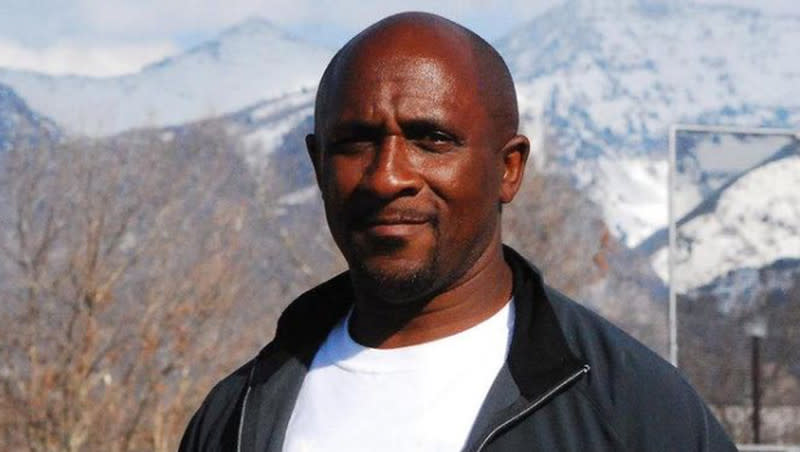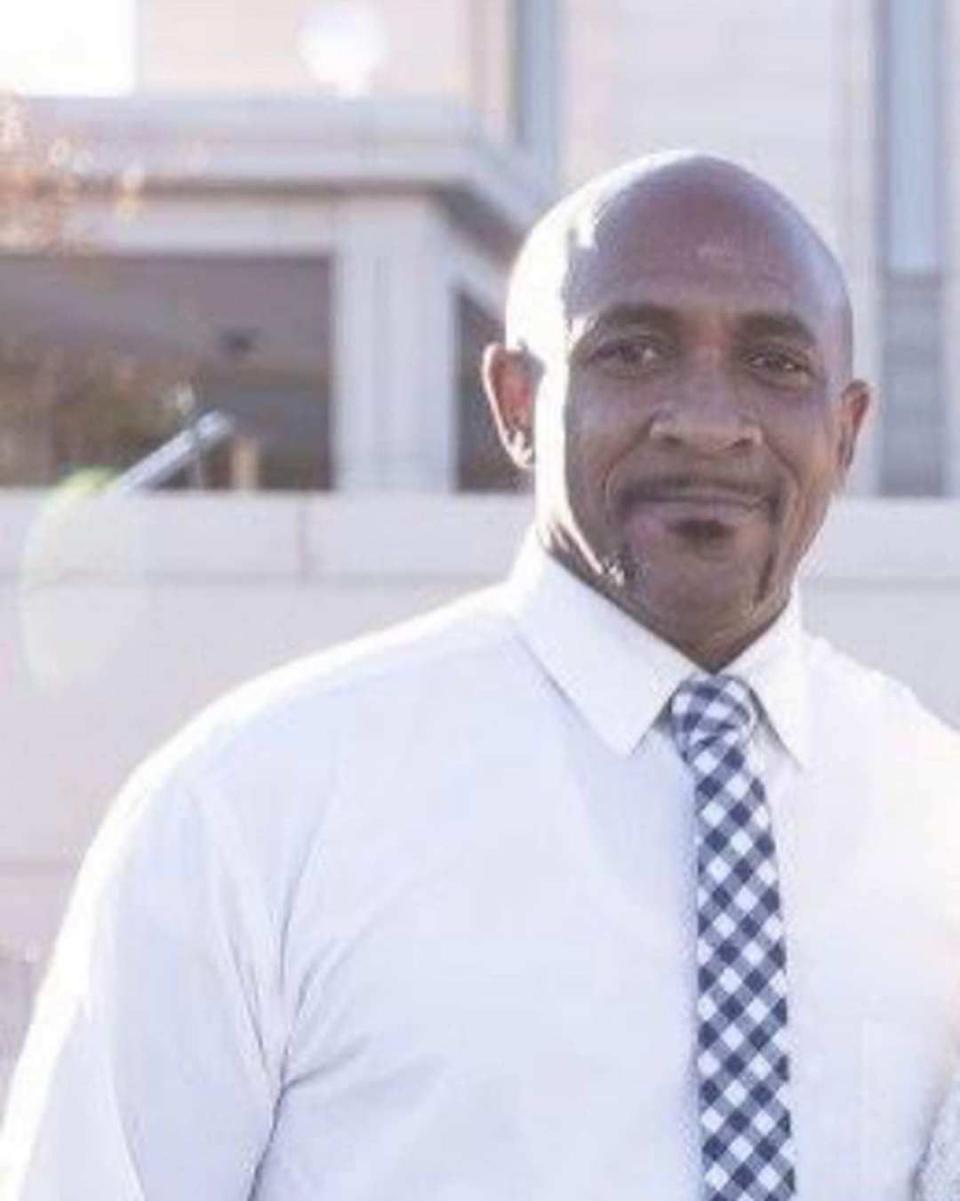Remembering track coach Tony Glover — and the ripple effect of his life

The last time I saw Tony Glover he was walking slowly across the parking lot through the falling snow to the track stadium at Corner Canyon High, where a workout was planned for the school team. When he arrived at the stadium, he leaned against a wall and spoke quietly, slowly and laboriously. His usual sparkle was gone.
“For me, Tony is the role model every child needs. He is the epitome of what I want every athlete to experience at some point in their lives — a great friend, a mentor, a coach, a positive person.” — Toni Hansen
Tony, who was an event coach for the school track team (as am I), had caught COVID-19 a year ago and ever since then he had had difficulty breathing, his blood oxygen levels dropping dangerously low at times. He required bottled oxygen much of the time and was hospitalized several times. He told us he had nearly died a couple of times. He had had another relapse the previous day, his temperature rising to 103.5. As we stood in a room underneath the stadium, waiting out the snow, I asked him the obvious question.
“Why are you here? Why aren’t you resting at home?”
“I’d rather be here than at home sitting around,” he said.
Anyone who knows Tony knows that he was there because he loved it. Loved coaching. Loved the nuances of technique. Loved the sport. Loved the kids above all. Loved all of it so much that he showed up for practice even though he was so sick and weak. Before our encounter in the stadium he had been seen sitting in his truck in the parking lot, slumped against the center console with fatigue.
Little did any of us know it was the last time we would see him. Three days later he was dead.
He died Sunday evening.
The news spread like wildfire on the internet. That’s because Tony — that’s all anybody ever called him — had coached thousands of kids for some three decades. He coached kids through the Mercury Track Club he founded. He coached at clinics on summer mornings. He coached kids at the Olympic Oval in the winter. He coached at several high schools around the state on spring afternoons.
There was hardly an athlete in the sport who hadn’t been touched by him in some way. Coaching wasn’t his job — he owned a company that installed temporary power at construction sites and did the work himself — but it was his passion, his raison d’etre.
“The ripples will be felt far and wide with the passing of Tony,” said Cal Beck, a fellow coach and former standout track athlete.
One of those ripples reached Kylie Hirschi Ross, who was introduced to track by Tony and his club in the seventh grade and went on to become a state champion and all-conference collegian. “I was just scrolling through his Facebook account back to 2010 and it was interesting to see how many of the athletes wrote that he was like a second father to them. That’s who he was. He made these kids feel so important. Kids can be so awkward and he could get through to them. He was so influential to so many kids.”
Hours after Tony passed away, I received an email from a friend: “He practically raised my wife and has been at pretty much every milestone in our marriage.”
It was always about the kids. Toni Hansen, the unofficial team mom of the Mercury club, recalls that when she went to Tony’s home she frequently saw “a random teenager or two living there. They were having a hard time with their parents or their lives. Tony would say, ‘You can stay with me.’ And he didn’t have a lot of money. He would struggle personally to provide for the kids.”
Jen Fitzgerald, who refers to herself as Tony’s secretary in the Utah USA Track and Field organization (where he served as youth chair), recalls, “He was like an uncle to my kids and a dad to everyone who didn’t have one. He’d take in kids off the street and take them into his home. He always had someone living with him who wasn’t family. He’d find them jobs. He’d get shoes for kids who didn’t have them. He made sure they had a way to compete. He showed up to everything. He was just the best man; he always made you smile. He wanted everyone to be happy. He pushed through his own stuff and loved the kids.”
There was the rub: Tony had a lot of “stuff” to push through. He was always pleasant, warm and humorous, but it belied a life filled with tragedy. Over the years he lost four children — his twins died in an accident many years ago, then his pregnant daughter died a few years ago (the baby survived) and one of his sons died in an automobile accident last August (Tony was babysitting his children at the time).
Sometimes Tony would tear open those wounds at the track, providing a fleeting glimpse of the grief he carried. “Nobody should have to go through this four times,” he’d say. “I outlived four of my children.”
Hansen, the team mom for Mercury, noted, “The kids kept him going. A day or two after (his son) passed away, he showed up at track practice. It’s where he wanted to be. It made him feel whole, giving back to these kids.”
Tony was well known but not known well. Many of his fellow coaches were uncertain about his background or even his age. He was 64 years old, but looked younger. He was raised in California. He said he competed in college track and field. He and his wife Jeanette had seven children together and three of them are alive, although there are others who claim him as a father by dint of his influence and care for them.
“He is that person you want in your child’s life,” says Hansen, who had three children on the Mercury team.
Hansen is a school teacher. She went to school on Monday morning, about 12 hours after learning of Tony’s passing, “because Tony would’ve wanted it.” Between classes she talked about Tony through her tears.
“For me, Tony is the role model every child needs,” she begins. “He is the epitome of what I want every athlete to experience at some point in their lives — a great friend, a mentor, a coach, a positive person. He was a role model who made me want to be a better person, a better teacher, a better parent. Everything. He was there to build you up. He was so kind and caring and funny and knew how to motivate.”
She witnessed many kids who came to the club with depression and other mental illnesses who were healed by their experience there. “So many of them said that if not for Tony they probably would’ve taken their own lives,” says Hansen. “That was the impact he had.”
Some people in the community called to contribute to this story when they heard it was in the works. They were eager to talk about Tony. Carl Wimmer, the former Utah State representative, wrote to say that Tony had helped his daughter become a track star when no other help was available in central Utah. This led Wimmer himself to form his own track club and youth program. He is now a track coach at Duchesne High School.
Doug Padilla, the former Olympic distance runner, sent an email praising Tony for his work with youth and noted that three days before Tony died he sent him a message apologizing for his late response, explaining that he was in the hospital with “RSV and something else.”
“His personal health has been a challenge for some time now,” wrote Padilla. “Yet, he would maintain his good spirit and work effort through it all.”
Many coaches embrace potential star athletes because, as Hansen put it, “they want to be part of the success,” but she noted that Tony went out of his way to nurture the less talented, as well. Roland Tolbert, another fixture in the youth track community who coaches the Cheetah track club, said the same thing. “He cared about each kid he trained, even the kids who weren’t talented. He’d help them develop and have success. Every kid can have success. We’d sit by the long jump pit talking about kids and it was not about superstars. He’d take a kid who was not talented and help him have success.”
Tolbert continued, “Tony’s a good guy who meant a lot to kids and the sport and to the community. Losing someone like that in our world is tough.”
Editor’s note: Those who would like to donate to Tony Glover’s family, here is a link to a GoFundMe account that has been set up for the family.
A Celebration of Life will be held Friday, March 31, from 6:30 p.m. to 8:30 p. m. at 3103 E Craig Drive, Salt Lake City, 84109. A funeral service will be held Saturday, April 1, at 12:30 p.m. at the same location.


